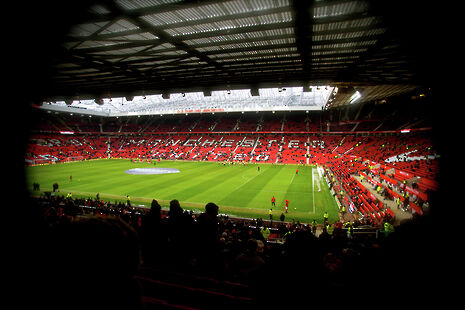‘Glory hunting’, local teams and me
Zack Case has a moan about the psychology of football fans
I have a confession to make: I am a ‘glory hunter’. Born in Hong Kong, the only football teams I knew when I was growing up were Manchester United and Real Madrid (thanks David Beckham). My family moved to North London in December 2004 when I was 7, at which point I was exposed to an abundance of teams in England and old enough to make a volitional commitment to Arsenal (‘till I die). At this point in time, Arsenal, ‘The Invincibles’, were the hottest team in town. I supported them because they were the best. Indeed, I hunted for glory.
The derogatory undertones of the term ‘glory hunter’ are completely misguided. There is nothing wrong whatsoever in supporting the team that is most likely to win the most trophies: surely every supporter wants his team to win every game, is happy when they win, and so will be happiest by picking the best team? One might even argue, myopically I should add, that people who support mediocre teams are wasting their time. Of course it is silly to propose that everybody should support Barcelona or Bayern Munich, and that trophies are the only measure of success/happiness for every football fan, but my point is that human beings are competitive animals who desire to win. Especially in sport, there is nothing wrong in hunting for glory.

I do not intend to give off the impression that glory hunting is a more valid reason why one should support a team. There are certainly no right and wrong grounds for choosing a team. In my case, with friends helping to inform my decision, it was important for my team to be able to challenge for titles (how wrong I was) and for the stadium to be relatively close to home so that I might be able to attend matches whenever possible - though dreams of a season ticket at the Emirates never materialised!
I do, however, intend to give off the impression that I have a problem with socially ‘acceptable’ explanations for supporting teams. The first conformist answer is something along these lines: "because my dad and my dad’s dad and my dad’s dad’s dad did." But is this any more credible than other answers? I do not deny that for many people, myself included, there is some beauty in the development of a parent-child relationship fostered over the mutual love of a team. However, there was a beginning to this hereditary chain of support: perhaps your great grandpa simply liked the colour of your team’s kit, personally knew the manager at the time or was a glory hunter? It is also true that children have agency: my dad is a Boston Red Sox fan, but I chose to be a New York Yankees fan. Supporting a team just because your dad did does not automatically exemplify loyalty or a ‘genuine’ connection to your team. "Because my dad did" certainly can be a motive but is not the motive for choosing a team.
What vexes me even more so is the self-righteous, haughty taunt aimed at those arbitrarily assumed to be glory hunters: “I support my local team.” This common chant implies that if you don’t support your local team you are a pseudo-fan, a fair-weather supporter. This is absurd. For one matter, it is arguably the long-distance fans, such as my Deputy Headmaster at school who travelled from London to Merseyside for every Everton home game, that demonstrate far greater commitment than the person who lives opposite the stadium. For them, every match is away.
This even verges on the racist: are non-Brits not allowed to support Premier League sides? A Chinese Newcastle supporter is certainly no less valid than a Geordie and should not be stigmatised for his or her support. In fact, given the globalisation of the Premier League, which recently announced a TV deal worth over £5 billion, football is now less about local identity than ever, since more and more matches are being televised around the world. Besides, those who claim superiority based on geography make themselves victims of hypocrisy in the (likely) instance that they migrate. Are these ‘authentic’ fans supposed to support a new local team every time they move to a new city? If so, they seem to be least authentic. At any rate, players, unless they move to a rival of course, rarely receive the same criticism by showing disloyalty – and by glory hunting. Why must fans adhere to such strict principles where supporting distant teams is considered unjustified? As long as a fan stays loyal to his team, wherever he lives, he is a good fan.

I am not saying that you should not be passionate about your team; I am not saying that your loyalty to a single team does not matter; I am not saying that supporting a local team is not important. I am simply suggesting that nobody has the right to criticise your reasons for choosing your team. The only job of a fan is to choose a team and, once that team has been chosen, to stick by them - far or near, Conference or Premier League, at the top or bottom of the table.
Loyalty, not locality, makes a true supporter. And with that support your team might well achieve glory.
 Features / Should I stay or should I go? Cambridge students and alumni reflect on how their memories stay with them15 December 2025
Features / Should I stay or should I go? Cambridge students and alumni reflect on how their memories stay with them15 December 2025 News / Cambridge study finds students learn better with notes than AI13 December 2025
News / Cambridge study finds students learn better with notes than AI13 December 2025 News / Uni Scout and Guide Club affirms trans inclusion 12 December 2025
News / Uni Scout and Guide Club affirms trans inclusion 12 December 2025 Comment / The magic of an eight-week term15 December 2025
Comment / The magic of an eight-week term15 December 2025 News / News In Brief: Michaelmas marriages, monogamous mammals, and messaging manipulation15 December 2025
News / News In Brief: Michaelmas marriages, monogamous mammals, and messaging manipulation15 December 2025









